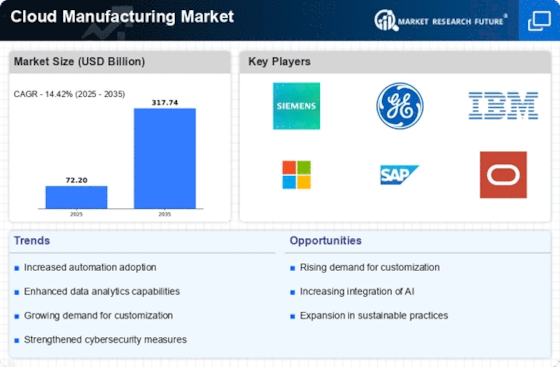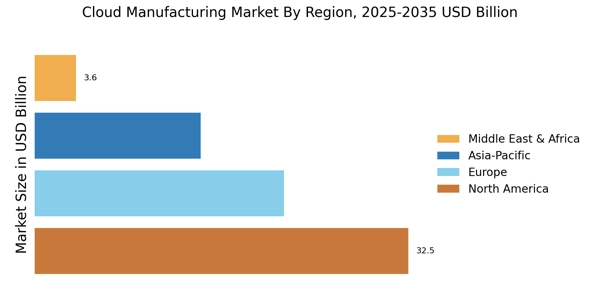Enhanced Supply Chain Management
Enhanced supply chain management is emerging as a critical driver in the Cloud Manufacturing Market. The ability to integrate various supply chain components through cloud platforms allows for improved visibility and coordination among stakeholders. This integration facilitates real-time tracking of inventory, orders, and shipments, which is essential for maintaining efficiency in manufacturing operations. Market analysis indicates that companies with robust supply chain management systems can achieve up to a 25% reduction in lead times. As manufacturers increasingly recognize the importance of agile supply chains, the demand for cloud-based solutions is expected to rise, further propelling the Cloud Manufacturing Market.
Growing Demand for Customization
The growing demand for product customization is significantly influencing the Cloud Manufacturing Market. Consumers are increasingly seeking personalized products, which necessitates a shift in manufacturing strategies. Cloud manufacturing facilitates this shift by allowing manufacturers to quickly adapt to changing consumer preferences and market trends. The ability to leverage cloud-based platforms enables manufacturers to efficiently manage resources and production processes, thereby reducing lead times. Market data suggests that companies that embrace customization can achieve a competitive edge, as they are better positioned to meet the diverse needs of their customers. This trend is expected to continue shaping the Cloud Manufacturing Market.
Regulatory Compliance and Standards
Regulatory compliance and adherence to industry standards are becoming increasingly important in the Cloud Manufacturing Market. As manufacturers face stringent regulations regarding quality, safety, and environmental impact, cloud solutions offer tools to ensure compliance. These platforms can streamline documentation processes and facilitate audits, making it easier for manufacturers to meet regulatory requirements. Data suggests that companies that prioritize compliance can reduce the risk of penalties and enhance their reputation in the market. Consequently, the emphasis on regulatory compliance is likely to drive the adoption of cloud manufacturing solutions, shaping the future landscape of the Cloud Manufacturing Market.
Integration of Advanced Technologies
The integration of advanced technologies such as artificial intelligence, machine learning, and the Internet of Things is driving the Cloud Manufacturing Market. These technologies enhance operational efficiency and enable real-time data analytics, which are crucial for decision-making processes. As manufacturers increasingly adopt these technologies, they can optimize production schedules, reduce downtime, and improve product quality. According to recent data, the implementation of AI in manufacturing has the potential to increase productivity by up to 40%. This trend indicates a shift towards more intelligent manufacturing systems, which are likely to dominate the Cloud Manufacturing Market in the coming years.
Cost Efficiency and Resource Optimization
Cost efficiency and resource optimization are pivotal drivers in the Cloud Manufacturing Market. By utilizing cloud-based solutions, manufacturers can significantly reduce operational costs associated with traditional manufacturing methods. Cloud manufacturing allows for better resource allocation, minimizing waste and maximizing productivity. Recent studies indicate that companies adopting cloud solutions can reduce their operational costs by approximately 20 to 30%. This financial incentive is compelling for manufacturers looking to enhance their bottom line while maintaining high-quality production standards. As a result, the focus on cost efficiency is likely to propel the growth of the Cloud Manufacturing Market.

















